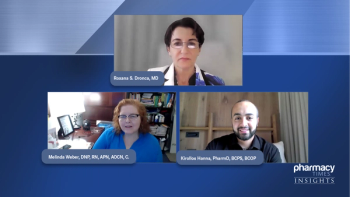
Financial Challenges Experienced by Patients and Solutions
Experts discuss examples of financial challenges patients experience that impact medication adherence, and potential solutions to address these challenges.
Episodes in this series

Suzanne Soliman, PharmD, BCMAS:What are some financial challenges that you have seen that patients might experience?
Lisa King, RPh: Well, especially in these challenging times, job loss, or even patients being in between jobs. Often patients—especially where I was working—may switch jobs and then not have health insurance for 3 to 4 months. Then they wonder, “What am I going to do? I know my co-pay used to be $5.00, and now I do not have insurance for 3 months until my new insurance begins.” I was really always so grateful that I was able to offer the prescription discount programs to patients. That is really a big thing for patients who are not having any insurance at the time. Even just offering it for other reasons—
health reasons, they may have really high co-pays for different medical reasons that they or someone in their family have—is good. Medical costs are on the rise. Really, being able to save wherever you can though prescription discount programs is just so beneficial for patients.
Suzanne Soliman, PharmD, BCMAS:Yeah, definitely; I agree. I think, right now, in terms of losing jobs and unemployment rates, a lot of people are between jobs or looking for a different job. I think that those patients are finding challenges because the other issue is that something that could have been on formulary on your insurance is all of a sudden not on formulary.
Lisa King, RPh: Yes.
Suzanne Soliman, PharmD, BCMAS:Then, you might need to change a medication you are taking that might have been recommended, you may have to take something differently. What do you do if you do not have coverage or something else is recommended, and you are waiting? I do think all of those are some of the financial challenges that they could feel. It can be difficult for business owners purchasing their own insurance.
Lisa King, RPh: Yes.
Suzanne Soliman, PharmD, BCMAS:Some have very high deductibles that they are trying to meet. I had 1 when I was working in a community independent pharmacy—I had 1 patient who had almost a $10,000.00 prescription deductible, which is outrageous to me. It was very difficult for them to meet that, so the cards were definitely a solution that they could use to help them. I do not know if you have thought of other solutions that can address some of these challenges for patients.
Lisa King, RPh: Yes, I was going to mention—that is the case that I am in right now. I have an extremely high deductible so I am mostly using prescription discount programs instead of my co-pay. It is really helpful. The other thing, too, is it is really helpful if a medication needs prior authorization and you are waiting for that prior authorization, which can sometimes take a bit of time. The prescription drug program is a really great way to possibly still start that medication while you are waiting for the PA (prior authorization) to come in place or have your doctor switch the medication or whatever it may be. You can still get started on your treatment.
Suzanne Soliman, PharmD, BCMAS:Yeah, you know what happened to me. I take a prescription medication and it was always on formulary. Then, this year, I had to get a prior authorization and I am saying, “I have been taking this for almost 20 years. All of a sudden I needed a prior authorization.” You are right, in the interim, I will say, “Oh my gosh, what am I going to do? It could just be new insurance or something changes, and all of a sudden the insurance wants the prior auth, and you are right. My physician worked on it very quickly and so did it my pharmacy but it still took almost 2 weeks for everything to work out.
Lisa King, RPh: Yep.
Suzanne Soliman, PharmD, BCMAS:This is a great time for these cards to be used and for patients to benefit from them. I also think that sometimes, with prescriptions for children, some of the antibiotics are often more costly on insurance than they are with some of the cards. I often tell parents to check out—when they are getting an antibiotic—to check out what the other price options are because sometimes, with antibiotics, you are just at the pharmacy once or twice a year for them. You are not really thinking about cost but when you get there you just go to pay. I often recommend to patients to check the options out there for antibiotics, too. Do you have other solutions that could help patients?
Lisa King, RPh: Yeah; there are several things that come to mind for patients to help with affordability of their medication. 1: ask about generic alternatives. I know my parents, for instance—my dad was prescribed a medication that was extremely expensive; it was a high-tier co-pay. They were upset. Often, patients who are older do not realize there could be an alternative medication. Definitely talk to your doctor and pharmacist about something that could be generic or a different drug in the same class that would be as effective. Another thing could be tablet splitting. If the patient is able to do that, it may be wise to talk to a doctor or a pharmacist about that, because often the higher-milligram strength will be the same exact price as the lower-milligram strength. You can get double the amount by being able to split the tablet. That is something that can be asked about as well. Many times there are different alternative medications. Really talk to your pharmacist about it because there are so many different alternatives that are less expensive and patients often do not really realize that. That is something really important for people to know as well.
Suzanne Soliman, PharmD, BCMAS:Yeah, I think the alternatives are a great option; just looking at what the alternatives could be can work.
Transcript edited for clarity.
Newsletter
Stay informed on drug updates, treatment guidelines, and pharmacy practice trends—subscribe to Pharmacy Times for weekly clinical insights.
























